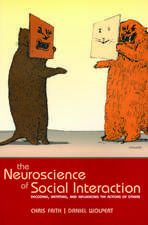Visual Masking: Studying Perception, Attention, and Consciousness
Autor Talis Bachmann, Gregory Francisen Limba Engleză Paperback – 21 noi 2013
- Provides succinct information about the widely dispersed masking studies and points out some new trends in masking research
- Reviews transcranial magnetic stimulation (TMS) as an alternative to the traditional psychophysical masking methods
- Comments on the methodological pitfalls hidden in the practice of masking, helping to improve the quality of future research where masking is used as a tool
- Informs readers about recent developments in theoretical attempts to understand masking
Preț: 144.40 lei
Nou
Puncte Express: 217
Preț estimativ în valută:
27.66€ • 28.49$ • 23.17£
27.66€ • 28.49$ • 23.17£
Carte tipărită la comandă
Livrare economică 15 februarie-01 martie
Preluare comenzi: 021 569.72.76
Specificații
ISBN-13: 9780128002506
ISBN-10: 0128002506
Pagini: 116
Ilustrații: black & white illustrations
Dimensiuni: 152 x 229 x 6 mm
Greutate: 0.17 kg
Editura: ELSEVIER SCIENCE
ISBN-10: 0128002506
Pagini: 116
Ilustrații: black & white illustrations
Dimensiuni: 152 x 229 x 6 mm
Greutate: 0.17 kg
Editura: ELSEVIER SCIENCE
Cuprins
PrefaceIntroductionThe Concept of Masking, Varieties of Masking, and Main Theories of MaskingLearning and individual Differences in MaskingCriterion Contents and Subjective Contents in MaskingMasking and Attention: Pre- and Posttarget EffectsMasking and Attention: OSMMasking and NCCMasked Priming and Unconscious ProcessingHow Masking Depends on the Visual characteristics of the Target and Mask StimuliUncovering the Microgenetic Mechanisms and Stages of Visual Processing by MaskingNovel Approaches in Masking ResearchMasking by TMSModeling and Theoretical Accounts of MaskingPsychopharmacological and Genetic Factors in MaskingApplied Aspects of Masking Research: Medicine and TechnologyGeneralizations and ConclusionsAcknowledgementsReferences
Recenzii
"Reading the book is not only instructive but also fun. It portrays many surprising new findings, which are well beyond the main discussions about the mechanisms of masking…It is a truly balanced and an exhaustive review. Great!" --Perception
"Unfortunately, the literature on masking is heavily distributed, with a low level of coherence. Clearly, a new book was needed and fortunately Talis Bachmann and Greg Francis have taken the challenge and filled the gap with a marvelous review book. The main bulk of the book is to review all current studies and theories on masking from 2006 onwards...the book has managed, in an elegant fashion, to present the current approaches to masking, together with their supporting and contradicting evidence. All experiments and theories are not only well presented but critically discussed...patterns within the ocean of unrelated topics become visible. Bachmann and Francis also cover applications, particularly, how masking is used in the clinic. Reading the book is not only instructuve but also fun. It is a truly balanced and an exhaustive review." --Reviewed by Michael Herzog, Ecole Polytechnique Fédérale de Lausanne (EPFL), Switzerland, for Perception, 2015, 0(0) 1-2
"Unfortunately, the literature on masking is heavily distributed, with a low level of coherence. Clearly, a new book was needed and fortunately Talis Bachmann and Greg Francis have taken the challenge and filled the gap with a marvelous review book. The main bulk of the book is to review all current studies and theories on masking from 2006 onwards...the book has managed, in an elegant fashion, to present the current approaches to masking, together with their supporting and contradicting evidence. All experiments and theories are not only well presented but critically discussed...patterns within the ocean of unrelated topics become visible. Bachmann and Francis also cover applications, particularly, how masking is used in the clinic. Reading the book is not only instructuve but also fun. It is a truly balanced and an exhaustive review." --Reviewed by Michael Herzog, Ecole Polytechnique Fédérale de Lausanne (EPFL), Switzerland, for Perception, 2015, 0(0) 1-2














